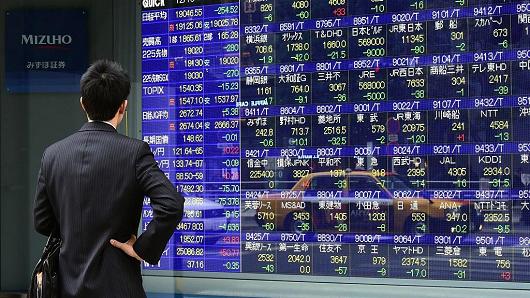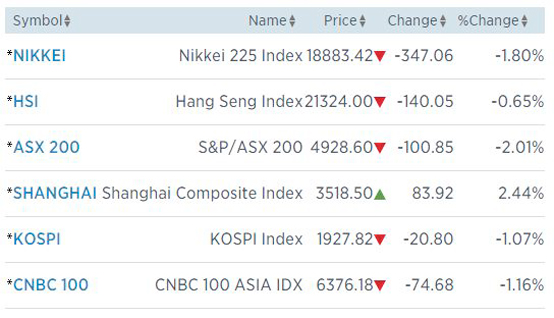Asian stocks trade lower, China bucks trend

Asian equities traded mostly lower on Monday, as investors remain focused on the mid-week decision from the U.S. Federal Reserve. The Chinese market bucked trends and traded up, boosted by upticks in shares of brokerages and banks.
Kathy Matsui, managing director and chief Japan strategist at Goldman Sachs Japan told CNBC’s “Asia Squawk Box” that it was not much of a surprise.
“We have a continued slide in the price of oil, so many people think this might reflect a weak global demand, coupled with the prospect that the Fed may start to raise interest rates later this week,” said Matsui. “So people are quite cautious, especially going into the year end when nobody wants to take a lot of risks.”
Energy stocks plunge
Oil prices saw no respite in Asian trade.
The West Texas Intermediate (WTI) oil futures, traded in the U.S., dropped 15 cents, or 0.42 percent, to $35.47 a barrel in Asian trade, while globally traded Brent crude futures fell 19 cents, or 0.5 percent, at $37.74 a barrel.
On Friday, the International Energy Agency (IEA) warned that global oversupply of crude could worsen next year as OPEC continues to pump out more oil.
Oil producers also saw sharp declines in their stocks. In Australia, shares in Santos were down 5.13 percent, Oil Search fell 5.56 percent, and Woodside Petroleum shed 2.7 percent. In Hong Kong, Cnooc shed 2.52 percent and Sinopec fell 1.81 percent.
Japan’s Inpex lost 3.55 percent and Japan Petroleum was down 2.89 percent.
ASX 200 slips below 5,000
The Australian market lost ground on the back of low commodity prices, with bank and resources plays firmly in the red. The main ASX 200 index closed down 100 points, or 2.01 percent, at 4,928 with energy and materials sectors down 3.27 and 2.16 percent respectively.
Shares in ANZ, Commonwealth Bank, Westpac, and NAB, Australia’s four largest banks, were down between 1.91 and 2.57 percent.
Two of the country’s largest miners, Rio Tinto and BHP Billiton, were also down 2.04 and 3.49 percent respectively.
Iron ore producers saw heavy losses in morning trade as the metal’s price dropped to $37 a tonne, down some 46 percent for the year. Shares in Fortescue Metals were down 2.45 percent, Atlas Iron shed 6.25 percent and BC Iron lost 17.24 percent.
The Australian dollar traded higher at 0.7199 against the U.S. dollar.
Chinese market back in the green
Chinese markets pared early losses and were back in positive territory, with the Shanghai Composite index up 15.5 points, or 0.45 percent, at 3,450. The smaller Shenzhen Composite was down 5.9 points, or 0.27 percent, at 2,189.
Brokerages and banks traded in positive territory in late-morning, offsetting declines in other sectors, as investors gained some confidence after the China Foreign Exchange Trade System (CFETS), an unit of the People’s Bank of China (PBOC), said the yuan can remain stable in medium to long term.
Shares in brokerages were up between 0.8 and 4.4 percent. Banking stocks were up between 0.35 and 1.55 percent.
The yuan traded near flat at 6.4575 against the dollar.
On Friday, the PBOC announced it would no longer peg the yuan to the greenback. Instead, it introduced a basket of 13 weighted currencies, including a combination of G3 and Asian currencies. The PBOC did not announce a date for implementation.
Reports emerged on Sunday that Fosun Group’s missing chairman, Guo Guangchang, was released from police custody. The company said he was in Shanghai to assist with an investigation.
Companies in which Fosun Group owns majority shares resumed trading on Monday with losses. Shares in Fosun International, which trades on the Hong Kong stock exchange, was down 10.49 percent, while Fosun Pharmaceutical was down 4.52 percent on the Shanghai exchange and down 11.65 percent in Hong Kong trade.
Japan, South Korea markets stay in the red
The Japan and South Korea markets were in negative territory amid the regional selloff.
The Nikkei 225 benchmark was down 412 points, or 2.14 percent, in morning trade to 18,818, and the Topix was down 27 points, or 1.76 percent, at 1,522 despite a better-than-expected quarterly Tankan Survey, a broad measure of business sentiment, released by the Bank of Japan before the market open.
The headline index for big manufacturers’ sentiment was at plus 12 points in December, unchanged from the previous quarter. For large non-manufacturers, sentiment was up 2 points to plus 25 for the same period.
Export stocks such as Toyota, Nissan, Honda, Sony were all down, falling between 0.3 and 3 percent. Heavyweights such as Fast Retailingand Fanuc were down 3.3 and 3.14 percent respectively.
In Korea, the Seoul Kospi was down 24 points, or 1.23 percent, at 1,924.
Blue chip stocks were firmly down in morning trade. Shares in Samsung Electronics traded 1.95 percent lower, steel manufacturer Posco was down 3.24 percent, and KB Financial Group fell 0.87 percent.
Shares in Hyundai Motor and Kia Motors were up 2 and 2.49 percent respectively, after local media Yonhap reported the two firms are aiming for higher auto sales in 2016.
Over in the U.S.
U.S. equity markets finished Friday lower. The Dow Jones Industrial Average was down 309.54 points, or 1.76 percent, at 17,265. The S&P 500 was down 40 points, or 1.94 percent, at 2,012 while the Nasdaq fell 111.7 points, or 2.21 percent, to 4,933.
On the data front, investors will be focused on the mid-week U.S. monetary policy decision from the Federal Open Market Committee’s meeting.
Elsewhere, Russian Prime Minister Dmitry Medvedev will start three-day state visit to China, as the countries look to strengthen their ties.
Source: CNBC – Asian stocks trade lower, China bucks trend






























